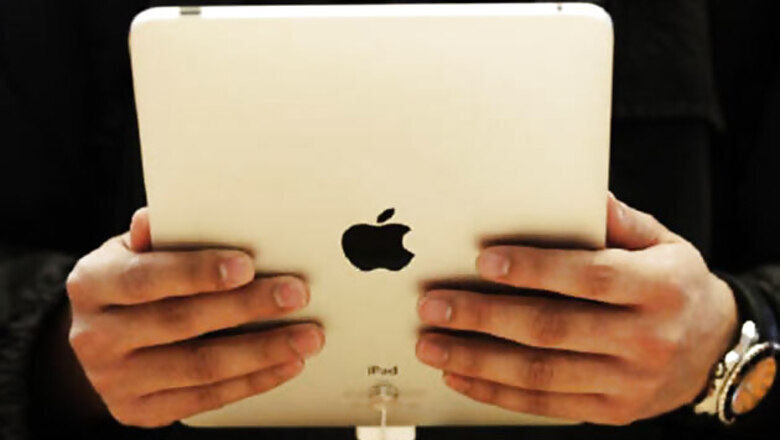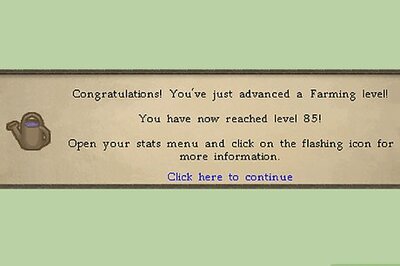
views
San Francisco: Shipments of tablets running Google Inc's Android will overtake the iPad this year for the first time, research house IDC predicted on Tuesday, as Apple Inc cedes more mobile market share to hard-charging rivals around the globe.
A growing variety of smaller and cheaper Android tablets from Google to Amazon.com Inc will catch on this year with more consumers and chip away at Apple's dominance since the first iPad launched in 2010, International Data Corp said.
iPad and iPhone shipments are expected to keep growing at enviable rates, but arch-rival Samsung Electronics and others have hurt Apple with a combination of savvy marketing, greater variety and rapid technology adoption.
On Thursday, Samsung takes the wraps off the fourth generation of its flagship Galaxy, the smartphone that helped the South Korean giant knock the iPhone off its top ranking for part of last year.
A growing perception that the company co-founded by Steve Jobs may be losing its competitive edge has weighed on its shares, which have lost more than a third of their value since hitting a high in September.
iPhone could go way of blackberry?
In the latest criticism from Wall Street, Jefferies analyst Peter Misek on Tuesday compared Apple to Blackberry saying the iPhone is now on the defensive against Samsung's devices.
"Historically when handset makers fall out of favoir (e.g., the Razr, Blackberry, HTC) they fall faster/further than expected," Misek said.
Now, IDC says Apple may begin losing some its lead on tablets as well, though it remains the top seller among manufacturers.
iPad shipments are expected to account for 46 per cent of the tablet market in 2013, down from 51 per cent last year, IDC said. Devices running Android are expected to grow their market share to 49 per cent this year from 42 per cent last year.
Google's Nexus 7 tablet and Amazon.com Inc's Kindle, which uses its own customization of Android, made major inroads with consumers last year. In November, Apple launched its own foray into smaller-sized tablets with the iPad mini.
"One in every two tablets shipped this quarter was below 8 inches in screen size. And in terms of shipments, we expect smaller tablets to continue growing in 2013 and beyond," IDC said in a press release.
Apple revs growth slows
Last month, Hewlett-Packard Co announced the launch of the Slate 7 tablet powered by Android, a centrepiece of that company's effort to expand from the shrinking personal market into mobile.
Apple is expected to grow its revenue by $26 billion in its fiscal year ending in September, just over half of the $48 billion increase in revenue it saw the year before, according to Thomson Reuters.
A group of suppliers that depend on Apple for more than half of their business saw its sales slump 31 percent in February compared to January, according to Topeka Capital Markets analyst Brian White, who does not identify the companies in the group.
Shares of Cirrus Logic, which gets three quarters of its revenue from selling audio chips to Apple, have fallen 23 percent this year, including a 2.89 percent drop on Tuesday.
Many component suppliers to Apple, like Qualcomm and Toshiba, also do significant business with Android device manufacturers.
"The open ecosystem at Android has allowed there to be more suppliers. As a chip guy, I always want to have as many irons in the fire as possible because the ride at the top tends to only last five years," said RBC analyst Doug Freedman.
Underscoring the increasing opportunity in mobile for Apple and its competitors, IDC also raised its 2013 tablet shipment forecast to 190.9 million units, up from its previous forecast of 172.4 million units.
Last year, global tablet shipments grew to 128.3 million units, up from 72 million in 2011, according to IDC.
In the smartphone market, which reached 545 million units shipped last year, Apple has already fallen behind Samsung.
Samsung is likely to sell 290 million smartphones this year, up 35 percent from 2012, according to Strategy Analytics. Apple's smartphone sales are projected to reach 180 million this year, up 33 percent.
IDC said tablets running Microsoft's Windows 8 platform would grow their market share from 1 percent last year to 7.4 per cent in 2017.
Tablets running the Windows RT operating system, which is not compatible with older software that runs on Windows, will see their market share stay below 3 percent through 2017, IDC said.
"Consumers aren't buying Windows RT's value proposition, and long term we think Microsoft and its partners would be better served by focusing their attention on improving Windows 8," IDC said.




















Comments
0 comment